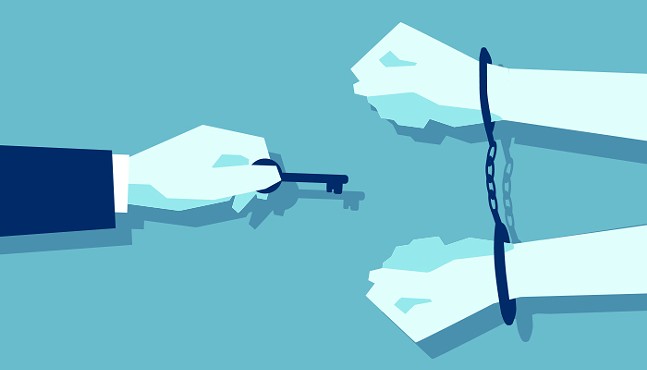Middleman, who challenged Stephen Zappala for Allegheny County District Attorney last year and works as a public defender, is one of a handful of lawyers and legal organizations offering free representation for those arrested during the protests.
"We felt strongly that our clients' First Amendment rights were violated and that they were put in an impossible situation with no means of actually getting out of Downtown Pittsburgh," says criminal defense lawyer Patrick Nightingale, who is part of Middleman's ad hoc team of attorneys offering their services. "We've heard story after story about client's being directed one direction only to be arrested once they arrived."
The most common charges are failure to disperse and disorderly conduct, both misdemeanors. With protests in Pittsburgh approaching their third consecutive week, Pittsburgh City Paper reached out to lawyers and legal organizations that are offering support for those arrested during the protests.
This list is being continually updated; please send any additional suggestions to [email protected].
ACLU Pennsylvania
If you feel your rights have been violated, you can file a complaint with the ACLU at aclupa.org/intake. But they note that the majority of complaints they receive don't fall within their mission, "because they do not involve constitutional issues or do not involve system-wide reform issues." ACLU is however a very helpful resource for people attending protests. ACLU Pa. director of communications Andy Hoover shared a few items to keep in mind, including:
- You are allowed to protest in any area open to the public, such as streets, sidewalks, town squares, or parks, even if nearby businesses claim to "own" the sidewalk.
- The First Amendment does not protect civil disobedience, which includes sit-ins or blocking access to private businesses (banks, stores, office buildings) or government offices. You might be arrested for those activities. If you hear an officer give an order to disperse, you will be arrested if you do not obey.
- If you are arrested, you do not have to and should not give the police the passcode to your phone.
- If you plan to participate in civil disobedience, make sure there is someone not at the protest whom you can call if you are arrested. Memorize their number — you will not have access to your phone if you are arrested.
- Follow the lead of the organizers in charge. Standing, sitting, chanting, and other such acts in unison show the collective power of the protests.
- Take care if you are live-streaming or taking photos to avoid capturing protesters' faces if the protest devolves into anything but 100% peaceful.
Contact: aclupa.org/intake
Healey Block LLC
Mike Healey's work focuses on labor unions and in civil liberties litigation, and "within the limits of time," is offering "representation of protesters through preliminary hearing stages, jury trials for sharply reduced fees," and reviewing civil liberties issues.
Healey's advice for people attending protests: "Stay with a group of people you know (i.e. an affinity group), have each other's phone numbers in case you are separated, and in case you are arrested."
Contact: [email protected] or 412-391-7711
Justin Romano
Working in a private practice but regularly offering pro bono services to those who need it, Romano was prompted to offer free representation for protest arrests because "standing up to abuses of authority should not result in criminal sanctions." Romano says it's important to know your rights before attending a protest and recommends reviewing ACLU's guidelines prior to heading out.
Contact: [email protected] or 412-336-8622
JD Law
Jennifer Dickquist is the owner of JD Law and co-founder of the Black Burgh Bail Fund (B3F), created in late May to provide bail money for people of color arrested during the protests, as well as those in Allegheny County Jail for low-level drug offenses and non-violent offenses. Additionally, Dickquist is offering some criminal services pro bono, and others at a sliding scale or flat fee. While Dickquist says the arrests have slowed and many of the early cases are being thrown out, she recommends reading up on your rights as a protester before attending these kinds of demonstrations.
"While law enforcement may violate these rights, they are still afforded to you and lawyers can help with violations in the aftermath," says Dickquist.
Contact for legal services: 412-295-8066
Contact to request bail funds: [email protected]
Lisa Middleman et al.
As the protests were beginning, Middleman reached out to request legal professionals to volunteer in helping "individuals who were arrested for, basically, being caught in the wrong place at the wrong time," says Patrick Nightingale. The group is coordinating with protest organizers, including Pittsburgh, I Can't Breathe.
While each volunteer attorney can decide how much of their fee they'll waive in participating, Nightingale says that they are all asked to commit to representation at the preliminary hearing level. Some have pledged to take cases to trial if necessary.
Contact: [email protected]
Max Walko
A former criminal prosecutor, Walko is offering his services for three or four cases free of charge.
Contact: [email protected] or 412-232-5029
National Lawyers Guild
The Pittsburgh chapter of NLG has a Legal Observer program, in which protest organizers can arrange for an individual trained by Guild attorneys to attend and "document interactions between demonstrators and law enforcement in anticipation of criminal defense or civil litigation."
The program is "designed to enable people to express their political views as fully as possible without unconstitutional disruption or interference by the police and with the fewest possible consequences from the criminal justice system."
Legal Observers do not participate in the demonstrations, provide legal advice, or serve as mediators between citizens and police. They are there to document.
To submit a request to have a Legal Observer attend a Pittsburgh protest, fill out this form.
More info: nlg.org/legalobservers
OTHER RESOURCES
Pittsburgh Pro Bono Center
Abolitionist Law Center
Bukit Bail Fund


